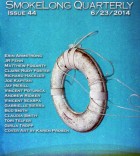Let’s begin with the ending. Throwing the biggest fish back in the river seems like a repudiation of the family structure and the narrator’s family in specific. Granted, that may not be the most sophisticated reading of your story. Would you like to enlighten us a little bit, please?
I know this is a typical writer’s response, but I think I’d prefer to let the reader interpret it. I didn’t come up with this—I think it was Margaret Atwood who said something like, once a story is out there in a way it is no longer completely yours. People will bring their own interpretations and experiences to it.
But, I like how she does this quietly. Originally I had a few more sentences, but cut back to this one for the last line. When she throws it back, I think that’s her strength.
So, let’s talk about memory. The narrator staring (being forced to stare?) at her mother who is being fondled by her father while the rest of the family is fishing. The juxtaposition of wholesome imagery and trauma isn’t a coincidence. How do these two events relate?
I think for me, in many ways, this short piece was trying to accomplish something that I’ve not really been able to accomplish in my stories until (hopefully) now. The truth is, many times something horrible is going on but the family still gets up every morning; the kids have Cheerios, the mom washes the dog, goes to the bank. At the risk of sounding pretentious—I hope this piece achieves the duality of lightness and darkness, stillness and action, that can exist in a family shot through with a problem like the problem this family faces.
Here’s a follow up question: What happens to the narrator?
Well. She’s got a kid; she’s grown up. I’m not sure her story is over yet. Maybe that’s a novel.
Please tell us about your writing and your writing process. What have you written? Where can we find it? How do you write? And what do you need to write?
Oh, thanks for the opportunity to plug my work!
I write as much as I can, when I can. Right now I’m interested in finishing a novel that involves some of the characters appearing in my last collection of short stories, Quarry Light. It isn’t done, but I’ve finished a draft. I’m a slow learner. It took me years to get flash fiction down, and then a few years ago I turned towards writing longer fiction. A good friend once told me that he pretty much learned how to write a novel when he tackled his first novel, and I think that’s what I’ve been doing off and on for the last year.
I’m also interested in writing memoir. But flash—well, I wrote most of the stories in my first collection when my son was a baby. I’d sit down and get through a draft during his nap. I used a prompt I learned from the writer Kim Chinquee for almost all of my short shorts; I would sit down with a list of words, focus on them, and write around them. Doing this freed me up as a writer, helped me to make connections and imaginative leaps I might not have made otherwise; it helped me to focus.
I stopped publishing much a few years ago, when I went back to school. But I think that was good for my writing in a lot of ways. I started trying new forms.
I was pretty prolific a few years ago, and had a lot of flash fiction and short shorts published online and in print—one of my stories made it into Norton’s The New Sudden Fiction Short Short Stories From America And Beyond. I’m still proud of that. My first collection of short shorts won Rose Metal Press’s first short short chapbook competition; Ron Carlson judged and wrote the introduction. That chapbook sold out; Rose Metal did such a beautiful job with it. It was Museum of Printing in North Andover, Massachusetts, and each copy was saddle-sewn together by hand. It was reprinted in 4-chapbook collection A Peculiar Feeling of Restlessness, so it is still available for purchase.
I have another collection of flash fiction, Put Your Head In My Lap (Future Tense Books, 2009). It can be yours for five dollars plus one dollar shipping! I also have a collection of stories, Quarry Light, that came out late last year with Magic Helicopter Press. I’m hoping the book gets out there; maybe this interview will help! The stories in that collection deal directly with violence and its aftermath.
Totally (partially) unrelated to writing question. Do you fish? What’s your general relationship with the outdoors?
I haven’t fished in years! But I did as a child. I love the outdoors. I don’t get out in it enough.


